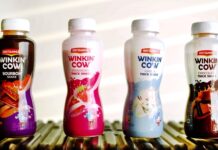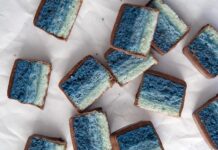Nestlé has introduced the first KitKat made with cocoa mass from beans grown by farmer families engaged in the company’s income accelerator. This KitKat aims to connect consumers with the farmers in Nestlé’s program and raise awareness about the sustainability of the cocoa used in the iconic bars.
The program was launched in January 2022 to help close the living income gap of cocoa-farming families and reduce child labor risk. At the same time, it strives to advance better agriculture practices and promote gender equality, empowering women as agents for positive change.
The program incentivizes cocoa-farming families that enroll their children in school, implement good agricultural practices, engage in agroforestry activities, and diversify their incomes.
Nestlé’s income accelerator program has so far supported more than 10,000 families in Côte d’Ivoire and is expanding to Ghana this year to include a total of 30 000 families. By 2030, the program aims to reach an estimated 160 000 cocoa-farming families in Nestlé’s global cocoa supply chain to create impact at scale.
Nestlé has collaborated with various partners and suppliers to transform its global cocoa sourcing and achieve full traceability and physical segregation of the cocoa sourced from its income accelerator program. This means being able to track the entire journey of cocoa beans from origin to factory, while keeping them physically separated from other cocoa sources.
The cocoa mass from the income accelerator program adheres to one of the highest traceability standards, ensuring ‘mixed identity preserved’ traceability, enabling cocoa to be traced and stored separately. In addition, by mid-2024, Nestlé plans to use segregated cocoa butter for all of its KitKat chocolate in Europe, with plans to expand to other regions in the coming years.
“KitKat has consistently embraced innovation, centered around its iconic ‘Have a break, Have a KitKat’. Today, this innovation is brought to life through the Breaks for Good initiative that puts cocoa farmers at the center of our product through our income accelerator program,” commented Corinne Gabler, head of confectionery and ice-cream at Nestlé. “We couldn’t think of a better brand than KitKat to represent our efforts to create meaningful impact in cocoa communities.”
The KitKat Breaks for Good will be available on store shelves starting from January 2024 in 27 European countries, and from May 2024, in the UK. In addition, a limited-edition KitKat, with 70% dark chocolate that is also made with cocoa sourced from the income accelerator, has been launched in the UK market as a pilot.
“Cargill is committed to supporting Nestlé’s longer term goals and their progress on delivering the Income Accelerator Program,” commented Michiel van der Bom, product line director Cocoa & Chocolate Europe West Africa, Cargill. “As a partner on Nestlé’s sustainability journey, we are implementing solutions to source sustainable ingredients for Nestlé in ways that help restore the environment, support families, and increase incomes. Through our partnership, we are building a stronger, more resilient supply chain together.”
“We’re delighted to collaborate with Nestlé on their journey towards more sustainable cocoa sourcing,” said Thierry Touchais, manager, strategic accounts at the Rainforest Alliance. “It’s encouraging to find a company of this scale using a ‘mixed identity preserved’ model in which cocoa can be traced back to Rainforest Alliance certified farmers engaged in Nestlé’s income accelerator. The approach showcases the potential for positive change in the industry.”
IndiFoodBev — authentic, impactful and influential
An English-language food and beverage processing and packaging industry B2B platform in print and web, IndiFoodBev is in its third year of publication. It is said that the Indian food and beverage industries represent approximately US$ 900 billion in revenues which implies more than 20% of the country’s GDP. Eliminating the wastage on the farmside can help to deliver more protein to a higher number of the population apart from generating sizable exports. The savings in soil, seeds, water, fertilizer, energy and ultimately food and nutrition could be the most immense contribution that country is poised to make to the moderation of climate change.
To improve your marketing and grow sales to the food and beverage processing and packaging industry, talk to us. Our research and consulting company IppStar [www.ippstar.org] can assess your potential and addressable markets in light of the competition. We can discuss marketing, communication, and sales strategies for market entry and growth.
Suppliers and service providers with a strategy and budget for targeted marketing can discuss using our hybrid print, web, video, and social media channels to create brand recognition linked to market relevance. Our technical writers are ready to meet you and your customers for content.
The second largest producer of fruit and vegetables in the world is continuously expanding processing capacities and delivery systems with appropriate innovative technologies. We cover product and consumer trends, nutrition, processing, research, equipment and packaging from farm to thali. Get our 2025 media kit and recalibrate your role in this dynamic market. Enhance your visibility and relevance to existing markets and turn potential customers into conversations. Ask for a sample copy of our bi-monthly in print or our weekly IndiFoodBev eZine each Wednesday.
For editorial info@ippgroup.in — for advertisement ads1@ippgroup.in and for subscriptions subscription@ippgroup.in
Naresh Khanna – 10 February 2025
Subscribe Now










